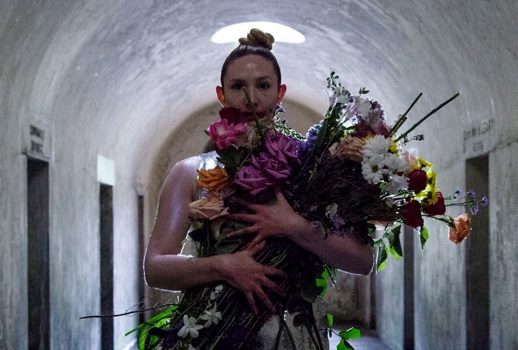

Elf Rose’s turn: mezzo Samantha Hankey
Composer/librettist David Hertzberg’s The Rose Elf, which gave its world premiere in the Green-Wood Cemetery Catacombs last weekend for a regrettably limited three-performance run, is indeed a marvel of elfin proportions.
Produced for new series The Angel’s Share and directed by bohemian-wunderkind R. B. Schlather, the opera aimed to help audiences test out the art form in an unlikely place, one scaled-back for a more intimate encounter. So on Friday night, following a whiskey tasting among the Brooklyn headstones, spectators were handed glow sticks, led down a narrow path toward the crypt, and ultimately seated in straight lines along the dimly-lit interior walls of a tunnel, facing each other.
The short show featured a glamorous cast of four young performers, as well as a nine-piece orchestra led by conductor Teddy Poll. Unfortunately, it also reaffirmed an age-old truism: sometimes, a mausoleum is best left to the ghosts.
Schlather, now in his 30s, is a big-ideas man with tremendous vision and superlative instinct. But by my stars, he’s also an overweening talent, occasionally sloppy on detail.*
At his best, Schlather conveys an inspiring earthiness, an expressionist zeal for his production’s source material. The Rose Elf, which offers a nontraditional retelling of an 1839 Hans Christian Andersen fable of the same name, follows a tiny elf who’s witnessed a man’s gruesome murder of his sister’s lover, and then exacts some grim (Grimm?) revenge on the villain.
Shrouding the work in near-complete darkness for the most part, the director plants his fantasy characters in a cavernous garden filled with flowers, a fantasy space overgrown with antithetical themes: illumination and abyss, nature and magic, blossoms and mortality.
These opposites he evokes not by action so much as through images—by having his actors move darkly from one end of the crypt’s tunnel to the other, say, or by heightening their shadows against a spotlight; by allowing them to writhe and slither on the floor; or even tumble over each other.
At one romantic zenith, for instance, the lovers grow so fervent, they’re inclined to pelt each other with rose petals, which fall around them in garlanded waves.
In some ways, it’s all an effective device. With their collaboration, Hertzberg and Schlather cut straight to the emotional pulse points of the story—the carnal sensuality between the lovers, the ambiguous tensions between sister and jealous brother, the trauma and violence of imminent death… and sort of stay there. Ultimately, what they give us is a translation to the stage that’s more impressionistic than faithful.
Case in point: instead of a straightforward prose summary of the narrative, the program notes supply a two-part “dithyramb” by the composer, replete with caesuras. “What’s this? A haven-hull disclosed with her hot kisses?” And so forth.
But then, Schlather’s hipster embellishments and unrelenting intensity would turn hysterical and begin to detract from (or even cheapen) the drama. More than once on Friday I wished we could simply allow a duet to unfold organically, without all the slithering, the singing into the floor, the climbing all over each other, the overblown costumery by Schlather and stylist Fay Eva. Why the elf had to frock up in a torch singer’s white sequined gown, topknot, and dominatrix boots shall remain a mystery.

More light, of course, would also have helped us behold all that the opera already had going for it. While Hertzberg the librettist could learn to ease up on the alliteration—a few cringe-inducing “Iowa workshop” moments so florid and precious, they stank—as a composer, he’s an absolute phenomenon.
Such lush, decadent musical passages and ecstatic vocal lines I’ve rarely heard from a young composer: Hertzberg gave us splendid moments—thanks in large part to Poll’s expert conducting—when I was sure I was hearing something straight out of the late Romantic period, though Strauss’ Daphne, an obvious inspiration, frankly isn’t as good.
In addition, those tasked with performing the material happened to turn in magnificent performances. As the Elf, willowy mezzo Samantha Hankey was in terrific voice, delivering long, swooning phrases worthy of Renée Fleming. Though I didn’t quite understand their incarnations as “Luna” and “Horus,” I equally loved the dreamy ingenues cast as the young lovers, tenor Kyle Bielfield and lyric soprano Alisa Jordheim, both of whom spun out such arresting lines of silver that I nearly lost my breath.
As the wicked brother, bass-baritone Andrew Bogard played a riveting villain, foregrounding the sibling’s erotic fascination with his sister and filling the tunnel with sound that boomed but seldom barked.
As part of the annual New York Opera Fest, these Crypt runs are always short; in many cases, I can understand why. Yet by the end of this particular show, the proverbial ghosts in the room were for me the performances that weren’t but could have been.
They’d be on a regular stage, with full lights and a broader budget, a reined-in Schlather, and maybe even a few extra musicians to help round out the brilliant score. They might even boast a few more flowers.
Lilies, perhaps, without all the gilding.
* Last November I took a train to experience a fresh take on the Virgil Thomson/Gertrude Stein oddity Mother of Us Allat the Hudson Opera House, where I was captivated by Schlather’s brassy, populist, town hall-style reimagining of a difficult work, much of which felt very edgy and interesting.
Even then, though, the director overdid it, and not infrequently. Blocking—up on the stage, planted in the audience, now sung out from the balcony—forced our sight lines in scores of jagged directions, muddling what could have been moments of brilliant simplicity, an imposed cacophony of political metaphors made following the already-nonlinear plot essentially impossible.
I don’t think I’ll ever quite shake the image of Schlather reclining on the floor like a tortured beatnik among attendees, polishing off his second can of Schlitz or Pabst or whatever it was and guffawing at jokes none of the rest of us could hear.
Photos: Matthew Placek
























Comments